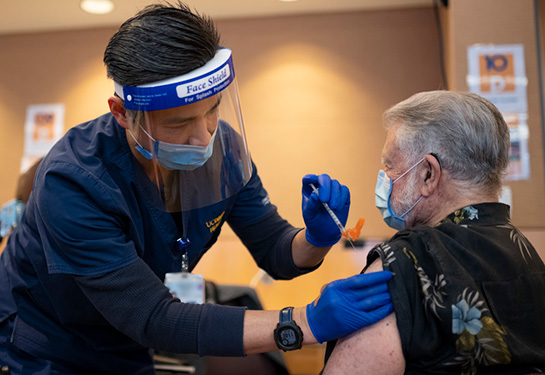COVID-19 vaccines in the Emergency Department for unhoused patients
UC Davis Health studying first Emergency Department-based COVID-19 vaccination program
UC Davis Health’s Department of Emergency Medicine is studying an Emergency Department-based COVID-19 vaccination program for patients without housing. The team recently conducted an assessment to evaluate the feasibility such a program.
After the US Food & Drug Administration authorized the emergency use of COVID-19 vaccines in the public, emergency medicine implemented a strategy to better reach patients without housing. The Emergency Department (ED) created a best practice alert in the electronic health records of these patients. It prompted providers to order COVID-19 vaccines for eligible patients. This was the first-ever ED-based COVID-19 vaccination program.
“Homelessness poses multiple challenges that can exacerbate and amplify the spread of COVID-19,” said James F. Holmes, executive vice chair of emergency medicine. “As many unhoused patients do not access traditional outpatient services, there are few opportunities to discuss and offer COVID-19 vaccinations to this population.”
According to an assessment by the Centers for Disease Control and Prevention, individuals living in homeless shelters experience some of the highest rates of COVID-19 positivity and mortality in the country.
Additionally, many people experiencing homelessness are older or have underlying medical conditions, placing them at higher risk for severe COVID-19–associated illness.
“For many uninsured and unhoused populations, the ED is one of the only sources of health care services available to them,” explained Holmes. “Therefore, their visits to the ED are often the best opportunity in which to deliver important public health services, such as vaccinations.”
For many uninsured and unhoused populations, the ED is one of the only sources of healthcare services available to them. Therefore, their visits to the ED are often the best opportunity in which to deliver important public health services, such as vaccinations.”—James F. Holmes
Data from the study
The investigators analyzed data between June 10 and August 26, 2021. During that period there were 25,871 patient encounters with 19,992 unique patients in the Emergency Department. There were 1,474 (6% of total ED population) visits in 1,085 unique patients who were without homes. The best practice alert notified providers in 1,046 encounters with patients experiencing homelessness (71% of total encounters with homeless patients). The alert was accepted in 79 encounters (8%).
As a result, 43 patients without housing were vaccinated because of the best practice alert, while 18 homeless patients were vaccinated without best practice alert prompting. For perspective, 76 patients who were not experiencing homelessness were vaccinated in the ED.
“The assessment showed implementing an emergency department based COVID-19 vaccine for unhoused patients is feasible, however, use of a best practice alert had minimal impact on whether a clinician ordered a COVID-19 vaccination,” Holmes said. “We need further studies to explore the utility of the ED as a setting for COVID-19 vaccination so we can engage individuals with vaccine hesitancy and provide education and reassurance about the efficacy and safety of vaccine administration.”


